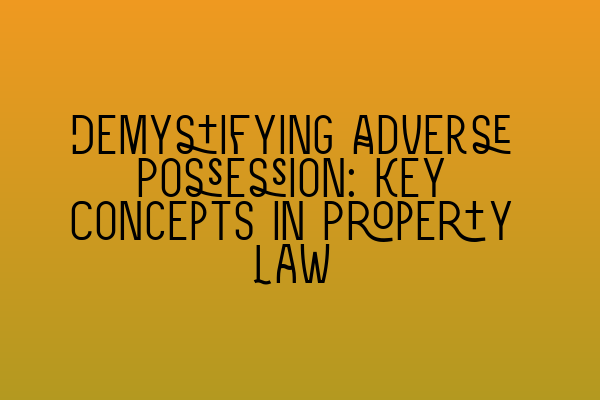Demystifying Adverse Possession: Key Concepts in Property Law
Introduction
Property law can be complex and intimidating, especially when dealing with the concept of adverse possession. However, understanding the key concepts surrounding adverse possession is essential for solicitors practicing in property law. In this blog post, we will demystify adverse possession, exploring its definition, elements, and implications.
What is Adverse Possession?
Adverse possession refers to a legal doctrine that allows a person to acquire ownership of someone else’s property through continuous possession for a certain period of time. In simpler terms, if a person occupies and uses someone else’s property without permission, and the true owner does not take any legal action to oust them within a specific time frame, the occupant may eventually become the legal owner of the property.
Key Elements of Adverse Possession
To establish a claim of adverse possession, certain key elements must be met:
1. Actual Possession: The occupant must physically possess the property and treat it as if they are the lawful owner. Mere casual or temporary use of the property is not enough.
2. Open and Notorious: The possession must be visible and obvious to the true owner. It should put the true owner on notice that someone else is claiming ownership.
3. Exclusive Possession: The occupant must have exclusive control and possession of the property, excluding the true owner and anyone else with a legal claim to the property.
4. Continuous Possession: The possession must be continuous throughout the statutory period, which varies depending on the jurisdiction. Any interruptions may defeat a claim of adverse possession.
5. Hostile Possession: The occupant’s possession must be without the owner’s permission. They must assert a claim of right to the property, irrespective of the owner’s consent.
Understanding the Implications
Understanding the implications of adverse possession is crucial for property law practitioners:
1. Legal Consequences: If an adverse possessor successfully meets all the elements for adverse possession, they can legally acquire ownership of the property. This can have significant financial and emotional implications for the true owner.
2. Time Limitations: Each jurisdiction has its own statutory period, often ranging from 5 to 20 years, within which adverse possession must occur. It is essential to be aware of the specific time limitations applicable in your jurisdiction.
3. Evidence and Documentation: To establish a claim of adverse possession, the adverse possessor must provide evidence of their possession, such as utility bills, tax payments, or improvements made to the property. As a solicitor, gathering and organizing this evidence is crucial.
4. Legal Defenses: The true owner can defend against adverse possession claims by proving their continuous possession or rightful title to the property. Being familiar with common legal defenses is essential when representing clients on both sides of adverse possession disputes.
5. Professional Advice: When dealing with adverse possession matters, seeking professional advice is highly recommended. Property law solicitors specializing in land law can provide invaluable guidance in navigating these complex cases.
Conclusion
Demystifying adverse possession is a critical aspect of property law. As a solicitor specializing in property law, understanding the key concepts surrounding adverse possession is essential for representing your clients effectively. By recognizing the elements and implications of adverse possession, you can provide expert guidance to your clients and protect their legal rights.
For further preparation on property law and land law, consider exploring our SQE 1 Practice Exam Questions and SQE 1 Practice Mocks FLK1 FLK2. Additionally, if you are looking for courses to prepare for the SQE exams, our SQE 1 Preparation Courses and SQE 2 Preparation Courses can be of great assistance. Stay updated with the latest SRA SQE Exam Dates and ensure you are well-prepared for success in your property law practice.
